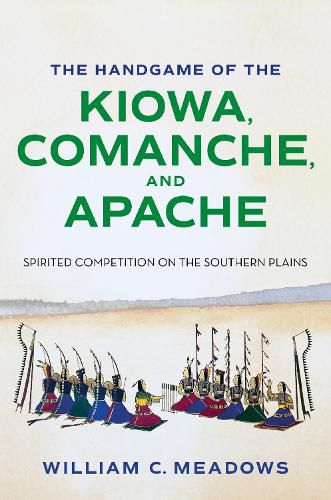Readings Newsletter
Become a Readings Member to make your shopping experience even easier.
Sign in or sign up for free!
You’re not far away from qualifying for FREE standard shipping within Australia
You’ve qualified for FREE standard shipping within Australia
The cart is loading…






The North American handgame has a long lineage, attested in the myth, oral traditions, and archaeological records of Native American people. In The Handgame of the Kiowa, Comanche, and Apache: Spirited Competition on the Southern Plains, noted scholar William C. Meadows examines the game's history, evolution, and practice from origin accounts to the present day among people of the Southern Plains American Indian nations. According to Meadows, the handgame, once primarily a source of winter recreation, now includes round-robin tournaments as well as public school and university teams. In fact, it has evolved to occupy an important social arena in Native American life. Based on ethnographic fieldwork and the author's own participation since the early 1990s, the book also incorporates extensive archival research in ethnographic, archaeological, and historical sources.
Examining such topics as the handgame's relation to language, gender roles, economics, and tribal sovereignty, Meadows argues that the game is just as important in tribal contexts as other more widely known activities such as powwows, dances, sweat lodges, and stickball in maintaining American Indian culture and ethnicity. The Handgame of the Kiowa, Comanche, and Apache affords readers a greater sense of how this traditional game has developed, how its practitioners feel about it, how it is played, and why it is, in the words of the author, "so spirited, popular, and infectious as an activity."
$9.00 standard shipping within Australia
FREE standard shipping within Australia for orders over $100.00
Express & International shipping calculated at checkout
The North American handgame has a long lineage, attested in the myth, oral traditions, and archaeological records of Native American people. In The Handgame of the Kiowa, Comanche, and Apache: Spirited Competition on the Southern Plains, noted scholar William C. Meadows examines the game's history, evolution, and practice from origin accounts to the present day among people of the Southern Plains American Indian nations. According to Meadows, the handgame, once primarily a source of winter recreation, now includes round-robin tournaments as well as public school and university teams. In fact, it has evolved to occupy an important social arena in Native American life. Based on ethnographic fieldwork and the author's own participation since the early 1990s, the book also incorporates extensive archival research in ethnographic, archaeological, and historical sources.
Examining such topics as the handgame's relation to language, gender roles, economics, and tribal sovereignty, Meadows argues that the game is just as important in tribal contexts as other more widely known activities such as powwows, dances, sweat lodges, and stickball in maintaining American Indian culture and ethnicity. The Handgame of the Kiowa, Comanche, and Apache affords readers a greater sense of how this traditional game has developed, how its practitioners feel about it, how it is played, and why it is, in the words of the author, "so spirited, popular, and infectious as an activity."